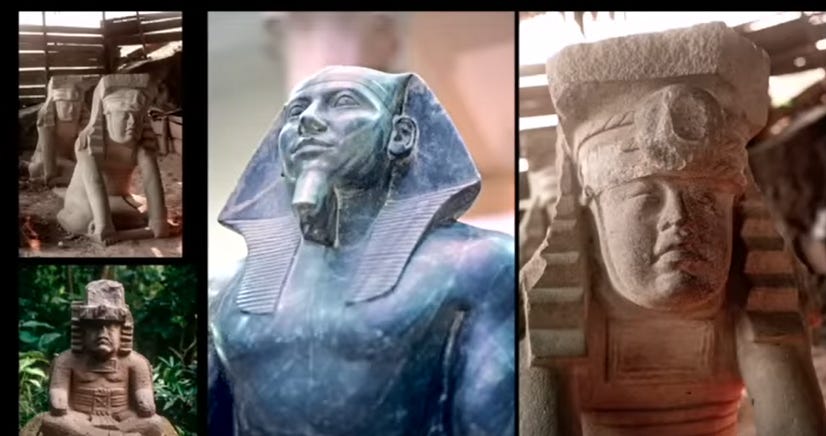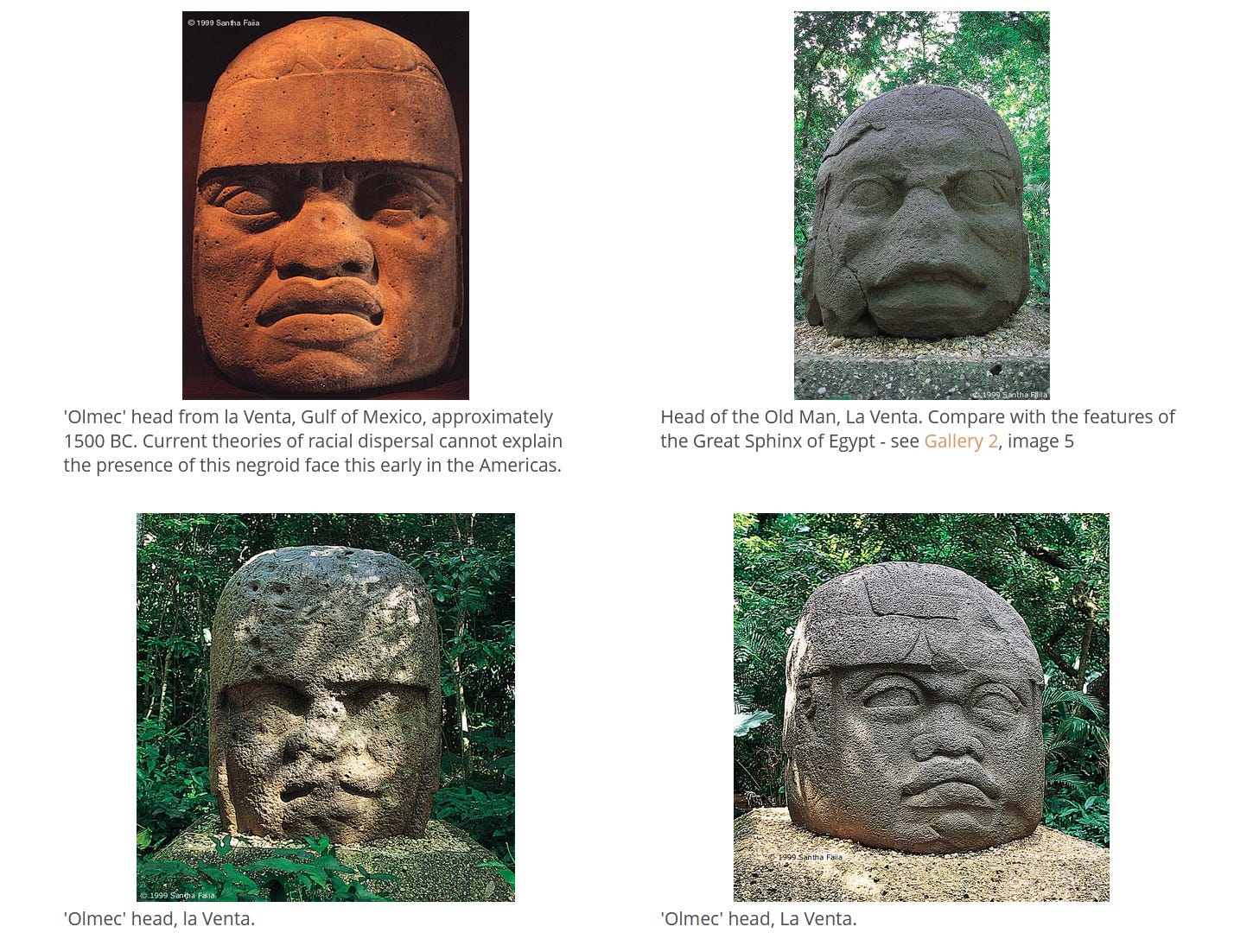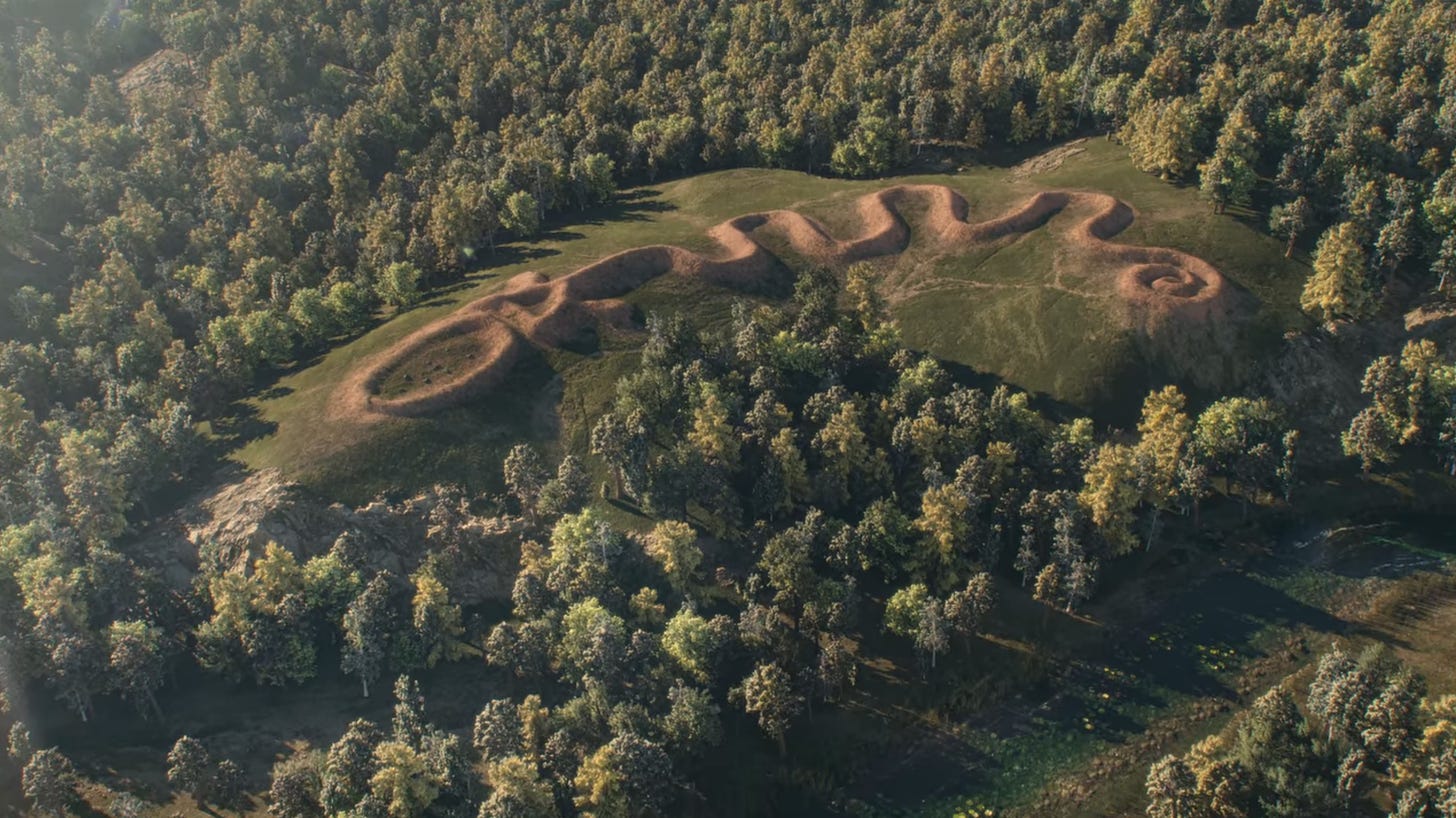If you’ve heard of Graham Hancock, there’s a good chance you discovered him from his series Ancient Apocalypse. The show premiered on Netflix in November 2022, briefly taking the world by storm, and becoming one of the most watched shows on the streaming service. Ancient Apocalypse, like many of Hancock’s books, goes over his quest to try and uncover a lost civilization that was wiped off the face of the earth during the Younger Dryas period around 12,000 years ago.
In short, Hancock’s theory is this: an advanced ice age civilization thrived 12,000 years ago before being destroyed in a cataclysm. The survivors of this civilization then introduced their beliefs and agriculture to hunter-gatherers—which is why several cultures thousands of miles apart seem to have eerily similar origin stories regarding their creation myths. Several theories for what cataclysm could have wiped this civilization out is the Younger Dryas impact hypothesis or a pole shift taking place. (Either option is pretty scary to imagine taking place today.)
Oh, and mainstream archaeologists absolutely despise Graham Hancock. He’s been labeled a hack, charlatan, pseudoarcheologist, and worse (we’ll get to that). There have been several petitions to get Ancient Apocalypse removed from Netflix or labeled as science fiction (which Netflix surprisingly ignored—maybe the streaming giant isn’t that bad after all).
I discovered Graham Hancock after picking up a copy of The Immortality Key by Brian Muraresku. Hancock provided a brilliant foreword that could truly open one’s eyes to the possibilities waiting to be discovered by venturing into the world of the little things that grow out of the ground. You may ask why Hancock would have been chosen to write the foreword for a book about the psychedelic beer drinking Greeks. Besides his work on the lost civilization, Hancock wrote Supernatural/Visionary, which highlights his quest to find exactly what caused the human mind to develop into what we are working with today. Hancock traveled to South America and took part in ayahuasca ceremonies for his research. This research has been his reason for claiming that the ancient civilization he has been searching for has roots in shamanism.
Anyway. After reading The Immortality Key, I highly recommend it to anyone curious about diving into the Eleusinian mysteries and the beginnings of Christianity, and about learning what made the great thinkers of antiquity think. The next step on my journey for the truth: I decided to learn more about Hancock. Seeing him on an episode of The Joe Rogan Experience, I was introduced to his theory regarding an ancient civilization. I’ve been hooked ever since.
Fast forward three years and I’ve listened to Hancock’s numerous Joe Rogan Experience appearances, watched Ancient Apocalypse, and read two of his books (Fingerprints of the Gods and Supernatural). Fingerprints of the Gods, published in 1995, was Hancock’s first book delving into this theory of a lost civilization. Since then he’s released two more, Magicians of the Gods and America Before. I plan on queuing up Magicians as my next audiobook.
In new editions to The Immortality Key, the world’s lamest psychedelic expert, Michael Pollan, saw the lucrative chance to add in a new preface to it which sandwiched Hancock’s wonderful piece between a boring preface and the beginning of Muraresku’s brilliant work—which undoubtedly must have people skipping over Hancock’s foreward after trying to get through Pollan’s introduction. I get why Pollan jumped on the bandwagon. He’s attempting to be the new more boring version of the original champion of the psychedelic movement and namesake of our dog, Aldous Huxley.
When I walked into Barnes and Noble recently and saw The Immortality Key on full display with Hancock’s name removed from the front cover in place of the sparkling NEW preface by Michael Pollan, I was extremely disappointed. I knew that it meant Hancock’s foreword getting buried in the mix. Why would someone want to silence his voice? Well, I’m sure it’s due to the claims mentioned above, and who better to shut him down but Pollan? Pollan is the perfect person to bore anyone regarding an interesting subject (like Hancock’s fringe theories).
Last week Hancock took to the Joe Rogan Experience. The episode had long been anticipated. He was to debate his claim of an ancient civilization with Flint Dibble, a real archaeologist. Dibble would be representing “Big” archaeology and the adamant denial of the possibility of anything Hancock says to be true. Dibble didn’t take kindly to the “Big Archaeology” label Hancock used against him, but Dibble did use the term in one of his tweets when trying to lobby against Hancock, so he kind of put it on himself there.
To be clear, I believe Hancock’s theory is true. If you want to say I’m biased, so be it. But when I first saw the podcast episode show up on Spotify, I was completely prepared to embrace the fact that Hancock was going to be outed as a hack and my fantasy of an awesome shaman culture able to harness abilities of the mind and world around us unlike anyone alive today could dream of was going to be completely obliterated.
But Dibble did not sway me to his side. After listening and against my better judgment, I took to X/Twitter and Reddit to hear what both sides had to say. This was a waste of time since our overlords already programmed most of the hivemind to side with Dibble, anyway.
It was clear Dibble was going to attack Hancock with evidence, and rightfully so. His beliefs are backed up by physical evidence found in his field. Hancock’s side is based on hunches more than anything, but his examples still hold up in the argument for the possibility of the existence of an ancient culture. Hancock argued that there’s still too much of the world unexcavated to deduce that his civilization didn’t exist—which Dibble refuted.
Here’s a few photos of two underwater sites Hancock had discussed:
Figure A is of the Bimini Road off the coast of the Bahamas. Figure B is of megaliths found in Kerema. Hancock says they appear to be manmade. Dibble, like everything else discussed, refused to even say it was possible. I’ll let you decide that one, but I see a possibility.
Here’s another highlight of the discussion. Have you ever heard of the Olmecs? They’re the earliest known civilization in Mesoamerica. Not much is known about them, but they have left behind one big thing—a few, actually. Their heads.
You may have seen one of the heads as the host of Legends of the Hidden Temple on Nickelodeon as a kid. Hancock and several others have mentioned the similarities between the features on the Olmec colossal heads and people from modern day Polynesia and Africa. The theory on this is that maybe the Olmecs, or the civilization which predated them, was started by seafaring Africans or Polynesians who crossed the ocean and settled in the area well before the other civilizations in Mesoamerica.
When Joe Rogan asked Dibble if he could at least agree that the Olmec heads had features similar to African or Polynesian people, Dibble still denied it. To me this showed us that he was not going to budge or get anywhere close to agreeing on a single thing Hancock had ever claimed.
Listen. I’m not saying that Hancock is 100% correct. Most of the evidence he had to show were megaliths which he claims look manmade. But I agree with his argument that it is possible for an ancient civilization to have existed, especially when he brings up how these megalithic structures seem to be built by a people with astounding knowledge of astronomy—we’ll get to that later.
The fact that Dibble could not even admit there being a possibility that there was a civilization predating anything we know is a testament to what is wrong with the experts today. He did bring some interesting evidence to the debate. His breakdown of how seeds have developed since the Ice Age was something I didn’t know, but I still didn’t think it ruled out Hancock’s theory. He explained that we can trace back exactly when agriculture first started by the evidence of seed development that suggests that humans didn’t start planting until after the Ice Age—which would rule out anything ever coming before then.
Another one of Flint Dibble’s arguments was the insistence of the evidence of hunter gatherers during the ice age. Since there is a bunch of evidence of hunter gatherers from the time period but none of Hancock’s civilization, it was enough for him to say that Hancock’s theory couldn’t possibly be true. But Hancock never said his civilization and hunter-gatherers couldn’t have both occupied the planet—there are hunter gatherer tribes alive today. But why the evidence of hunter gatherers and not Hancock’s civilization? Who knows—maybe they figured out a way to survive with a way of feeding themselves that was lost to time along with the rest of their culture. It’s possible.
The most fascinating thing about the civilization that Hancock discusses is their connection to astronomy. The sites he has discussed seem to have been built in orientations that line up with the solstices and equinoxes (like Serpent Mound in Ohio). Dive deeper and you’ll find theories on the orientation of the pyramids reflecting Orion’s Belt and the sphinx (which is possibly 12,000 years old).
Robert Bauval’s Orion correlation theory suggests the Giza pyramids were built to reflect the three stars of Orion’s Belt, aligning to within a fraction of a degree of the cardinal direction of the stars (whatever that means). Diving deeper into Hancock’s work you will discover sites like Serpent Mound in Ohio align perfectly with the summer and winter solstice and the autumn and spring equinox. I wonder what they were trying to accomplish by doing this.
One of my favorite topics is the Sphinx. In the 1990s, Dr. Robert Schoch of Boston University (PhD in Geology and Geophysics) dropped a bombshell. After much research, he deduced that the water erosion evident on the Sphinx’s body would suggest it was built much earlier than previously thought—roughly the same time as Hancock’s lost civilization would have existed. Hanock and Bauval expand on the Sphinx further, suggesting it had originally had the head of a lion and faced the constellation of Leo during the time of construction, which would align with the Ancient Egyptian creation myth period of “Zep Tepi”, the “First Time.” These theories suggest the ancient Egyptians inherited the pyramids and Sphinx from their ancestors rather than building them for the tombs of pharaohs, which is what’s suggested today.
Dibble scoffed at the possibility of any of this being true, either.
So, what were the pyramids for if not being used as tombs? Here's an awesome video from The Why Files on Youtube which, I believe, explains exactly what they were built for. Hancock has never mentioned this theory, but you should watch it anyway—it’s nuts!
Back to the debate. One of the most preposterous claims from Dibble, much like many of his peers, is the claim that Graham Hancock’s theory promotes the spread of white supremacist ideas. To believe that is truly moronic.
Dibble and his peers claiming that the idea of an ancient civilization predating any that we have discovered promotes white supremacy is mind boggling. They argue that Hancock’s claims of an ancient civilization (like the Olmec example and the ancient Egyptians inheriting the pyramids and sphinx) strip away the local culture and heritage.
Just think about that for a second. We’re talking 12,000 years ago here. Nowadays cultures change, adopt, and expand by the generation. A hundred years ago my ancestors were farmers in Sicily fighting for survival. Today my parents talk to me about keeping our traditions alive. Traditions which have only existed since my first grandparent stepped foot in the United States in the early 1960s. Do you get what I’m saying?
If there was a group of seafaring Africans who settled in Mesoamerica 12,000 years ago, that would be awesome! You know what else? It wouldn’t change a thing. The cultural history of the Americas as we know it wouldn’t be any different. Everyone has to come from somewhere, right? What’s the difference between badass sailors boating across the Atlantic versus settlers walking over the Bering Land Bridge? It’s a weak argument to say that an idea like that strips people of their heritage, I think it makes the history of the people potentially way cooler.
So, to say theories of ancient Africans or Polynesians inhabiting Mesoamerica thousands of years ago OR the ancient Egyptians finding the pyramids and Sphinx doesn’t change a single cell of the identity of the people who come from there today. For Dibble and co to claim that it does makes me think that Hancock must be onto something here, otherwise why get the radical left involved? Once that ignorant group gets involved it usually spells an end to any hope for common sense. Plus, when Netlflix released Queen Cleopatra featuring an African-American actress as Cleopatra and an opening monologue of a woman stating ‘No matter what anyone else tells you, Cleopatra was black!’, Egypt SUED Netflix over the spread of misinformation because it is known that Cleopatra was a descendant of the Ptolemy family of Greek origins. So, I don’t think the people are as sensitive as the minority who screams on the internet, yet they’re the ones whose voices are heard… but that’s a problem for a different day.
Also, some Olmec artwork shows their rulers with similar headdresses as Egyptian pharaohs. Could there have been a link to the two? It’s an interesting idea to think of. Do your own research, have some fun, and if you are so adamant that Hancock is a moron—take the stick out of your you-know-what and have fun with the possibilities. What I know for sure is that no one alive was there and we really don’t have a clue as to how these people acted back in the day. Maybe they rocked out to their version of Steely Dan and ate fat-free frozen yogurt, too!

Listen, the proof Hancock has is not concrete evidence. The Earth has been spinning for a long time. Poles shifted, meteors struck, tsunamis crashed, and volcanoes exploded. Lizard people could have walked the earth 100 million years ago wreaking havoc with their flying cars and steam-powered mechanical dildos. There could have been a race of conscious gases that floated around taxing the dinosaurs and mandating bogus vaccines on sharks.
The point is we will never know what happened in the past. Sure, there’s evidence for hunter gatherers—they existed. There are also creation myths from around the globe talking of floods and saviors. I, like Hancock, do believe this would suggest that there could have been a civilization before any we knew. One that had few survivors from a cataclysm, who spread their ideas to other survivors and built-up new civilizations with their own cultures—until we ended up here.
Who won the debate? I give the slightest edge to Hancock because I agree with the possibility of a civilization having existed back then. But here’s the thing. Both men were set on the answer they wanted before they did research. When their goals were to prove or disprove a theory, it’s easy to do so because they get to use whatever facts they want to use to reach the answer they wanted. Does one give precedence over the other? I don’t think so. I just think Flint Dibble and anyone else vehemently denying Hancock’s claims are way out of touch. It’s a mystery; you can’t say with certainty that anything we know from any of these ancient cultures is accurate.
Nowadays “Big Archaelogy” and “Big Media” and “Big Government” don’t want you to believe anything is possible. And it’s a shame. Because anything is possible, and if someone is telling you otherwise—they’re wrong.
I leave you with this:
“The only thing that I know is that I know nothing.” –Socrates.
Thank you for reading. If you enjoyed this article and want to support my work, consider becoming a free or paid susbcriber.










To me it's rather obvious Hancock is right in many areas. There almost assuredly have been cultures far advanced in ways we are not that have come and gone considering we've supposedly been around for 250-300k years. It seems rather unlikely that we at the apex, or as western civilization suggests that we are on a straight line of progress. If our brains were mostly the same as they are now then it just wouldn't take that long to advance.
Also, I believe the wisest cultures probably left little trace intentionally. Likely living in balance with nature; choosing symbiosis instead of domination. Only an idiotic culture sans grace, humility or wisdom would choose to scar the earth as we have.
Further, dominator societies lie all the time about history. They are constantly creating narratives of convenience as we can clearly see happening now.
Glad you found Hancock's work. I learned of it years ago and went farther down that rabbit hole. There are a lot of researchers (Billy Carson, Erich Von Daniken to name two) with interesting ideas in the same camp as Hancock. What they've compiled is difficult to dispute for those with an open mind.
It's interesting that the academics label Hancock's work pseudoarcheology. Academia labels natural health research pseudoscience, even though it's been around for thousands of years whereas academia's medical gods have only been around for just over 100. Of course, their $trillion business would take a hit if people ever got on board with natural health, and you can't have that - can you.
OH, and let's not forget - there's the interesting bit of the evidence that our DNA was spliced 200,000 years ago and that we didn't evolve. Gregg Braden calls it the God code and yeah - it's a big red pill to swallow.